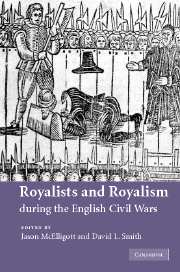Book contents
- Frontmatter
- Contents
- Notes on contributors
- Preface
- Abbreviations
- 1 Introduction: rethinking royalists and royalism
- 2 A lesson in loyalty: Charles I and the Short Parliament
- 3 The Court and the emergence of a royalist party
- 4 Varieties of royalism
- 5 Royalist reputations: the Cavalier ideal and the reality
- 6 Counsel and cabal in the king's party, 1642–1646
- 7 ‘I doe desire to be rightly vnderstood’: rhetorical strategies in the letters of Charles I
- 8 Royalists and the New Model Army in 1647: circumstance, principle and compromise
- 9 The royalist origins of the separation of powers
- 10 ‘A No-King, or a New’. Royalists and the succession, 1648–1649
- 11 The royalism of Andrew Marvell
- Subject Index
- Author Index
2 - A lesson in loyalty: Charles I and the Short Parliament
Published online by Cambridge University Press: 19 July 2009
- Frontmatter
- Contents
- Notes on contributors
- Preface
- Abbreviations
- 1 Introduction: rethinking royalists and royalism
- 2 A lesson in loyalty: Charles I and the Short Parliament
- 3 The Court and the emergence of a royalist party
- 4 Varieties of royalism
- 5 Royalist reputations: the Cavalier ideal and the reality
- 6 Counsel and cabal in the king's party, 1642–1646
- 7 ‘I doe desire to be rightly vnderstood’: rhetorical strategies in the letters of Charles I
- 8 Royalists and the New Model Army in 1647: circumstance, principle and compromise
- 9 The royalist origins of the separation of powers
- 10 ‘A No-King, or a New’. Royalists and the succession, 1648–1649
- 11 The royalism of Andrew Marvell
- Subject Index
- Author Index
Summary
‘Treason doth never prosper; what's the reason? For if it prosper, none dare call it treason.’
How did Charles I become a royalist? The question is worth considering. What factors made him willing to turn into the head of only a part of the body politic? There could be no royalism without the king and no king would readily accept that his nation was divided against itself. Loyalty or treason were stark alternatives and Charles only reluctantly decided to pose them. Despite numerous provocations since the onset of the Scottish rebellion, he was acutely aware of the consequences of escalating the situation. ‘It is … my own people, which by this means will be for a time ruined, so that the loss must be inevitably mine’, he lamented to the marquis of Hamilton in 1638. The Scots were those ‘for whom it was glorious neither to conquer or be conquered’. Though his disinclination to engage in war in 1639 is variously attributed to military or financial weakness, Charles's recognition of this simple fact was equally significant. His campaign against the Scots should ‘not be thought to be by way of a war, but by way of a Prince, the Father of his country, his chastising his unruly children, which is never in anger, but in love and for their good’. The king's conception of his obligations to his people necessarily made him a reluctant protagonist.
Surely the events of 1641–2 provide the proximate answer to this question.
- Type
- Chapter
- Information
- Royalists and Royalism during the English Civil Wars , pp. 16 - 42Publisher: Cambridge University PressPrint publication year: 2007



